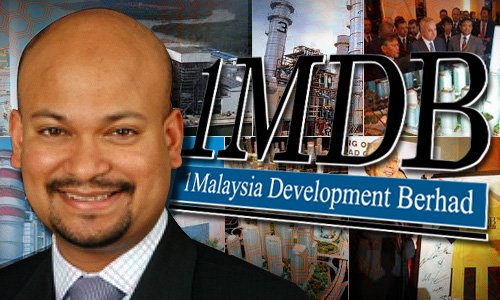
Pua said that though Arul Kandasamy was not responsible for the company’s “dire state of affairs” today, it be risky to ignore the problems facing 1MDB and exonerating the company of its “sins”. (Pic from Malaysiakini)
Never defaulting on its loans does not make 1Malaysia Development Berhad (1MDB) a responsible borrower, said Tony Pua in a statement today.
Responding to attempts by the sovereign wealth fund to defend its credibility, the Public Accounts Committee (PAC) committee member said that 1MDB’s track record of missing repayment deadlines and borrowing at a high cost, deemed the company as a “reckless borrower” instead.
“1MDB has been reckless in borrowing to lend money and it has been reckless in paying over-the-top to borrow the funds,” he said in a statement today.
Last week, Bloomberg had reported 1MDB defending its credentials as a borrower after a newspaper reported that it failed to repay a loan of more than US$ 500 million (RM1.75 billion).
“As far as the banking sector and the credit sector is concerned, we are responsible borrowers, and the company has never defaulted,” Arul Kanda, newly named president of 1MDB was quoted as saying. “We need to manage the use of our cash in the most efficient way for the company,” he added.
Pua weighed in on Kanda’s comment, saying that it was absolutely true that the company had not defaulted on its loans.
“However, that does not at all mean that 1MDB does not have any troubles paying its debts or does it in anyway qualify 1MDB as a “responsible borrower”.”
Pua pointed to the fact that 1MDB had missed two repayment deadlines for a RM2 billion debt in November and December 2014; which he said was part of a rescheduled and restructured debt it failed to pay in November 2013.
According to The Edge Financial Daily, Bank Negara had hauled up 1MDB’s key executives and warned that they would face consequences if the debt was not settled.
“In fact 1MDB is facing its current predicament of a cash crunch and facing extremely difficulties in servicing both its operational and debt commitments is a direct result of 1MDB’s history not being a “responsible borrower”,” added Pua.
Instances of borrowing recklessly
Pua said that 1MDB was not “world famous” for borrowing at money at extremely high interest rates. In 2009, he said, 1MDB borrowed their first RM 5 billion at 5.75 percent interest while giving a 12 percent discount in the 30 year bond despite a Federal Government guarantee.
“The effective interest rate paid was hence 6.71%, despite the 10-year Malaysia Government Securities being priced only at 3.85% then.” Another example given was the issuing of two other bonds in May 2012, amounting to USD 3.5 billion paying a coupon rate of 5.99 percent despite a guarantee by the International Petroleum Investment Corporation (IPIC), an investment arm of the Abu Dhabi Government.
“On top of the excessive “commissions, fees and charges” exceeding 11% of the funds borrowed, 1MDB had to deposit 40% of the funds with Abu Dhabi and grant them options to 1MDB’s power plant investments.”
“1MDB further issued a US$3 billion bond in March 2013 and paid Goldman Sachs a whopping US$282 million in “commissions, fees and charges”, well exceeding international norms of less than 2%. The proceeds of the loans was meant to be invested in a joint venture, Abu Dhabi Malaysia Investment Corporation (ADMIC).”
“However, after nearly 2 years, ADMIC remain stillborn while nearly half the money raised have been siphoned for “working capital and debt repayment purposes” last year.” Pua said that these examples in no way described 1MDB as a responsible borrower.
Apart from this, Pua also said that 1MDB was borrowing money for the purpose of lending money. In 2010, the company had lent USD 1.2 billion to Petrosaudi International, a company which Pua said had no tangible track record. Subsequently, more money was borrowed (USD 700 million) and lent to the oil company.
“Petrosaudi was founded only in 2005 by a Tarek Essam Ahmad Obaid who was then in his late 20s. How were such borrowings in any way “responsible”?” asked Pua.
Though fully redeemed in full in 2013, according to Pua, the money was controversially “invested” in the Cayman Islands.
This was despite a commitment to their auditors Deloitte Malaysia that the funds will be fully redeemed and received by the end of November 2014. The said USD 1.23 billion sum is yet to be repatriated to date.
“1MDB has been reckless in borrowing to lend money and it has been reckless in paying over-the-top to borrow the funds,” said Pua. He also said that the company was abusing its near-sovereign status due to government guarantees to borrow excessively.
“It is precisely because 1MDB has been an irresponsible borrower that it has accumulated a debt exceeding RM42 billion, threatening the entire Malaysian financial system with its inability to pay up a mere RM2 billion debt due since November 2014.”
Pua added that though Arul Kandasamy was not responsible for the company’s “dire state of affairs” today, it be risky to ignore the problems facing 1MDB and exonerating the company of its “sins”.
“Without recognising the major mistakes committed to date, he cannot possibly cure 1MDB’s ills and turn around the fortunes of the besieged company,” Pua said. -The Rocket



